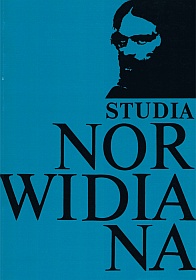Epistolarny autoportret Cypriana Norwida
Abstrakt
Current theories of literary research deriving from the sphere of postmodernist aestheticism make us particularly alert to the creative power of the word with regard to non-verbal reality. The word, subject to a variety of immanent conventions, including the convention of literary genre, creates unique textual entities. The alertness enables us to look anew at the autobiographic stamp so characteristic of Cyprian Norwid's work. Earlier scholars have used its presence to illustrate their biographic arguments, but as they discussed various elements of the poet's biography and cited passages from his works they erred (as I think) in ascribing equal information value to his pieces representing different literary genres.
The present study was initially written on the assumption that the reading of Norwid's letters would confirm the vision of the poet's self-portrait familiar from other sources (and from letters, previously considered on a par with his other works). That expectation was borne out only in part. The letters do reveal first of all the familiar figure of a solitary man, injured by people and intending to lay down the pen for the fine arts or else to start writing exclusively in French. However, it also becomes clear that the solitude often was of Norwid's own choice. It was the effect of his moods or of his genuine dislike of people, sometimes a dislike they did nothing to deserve. The letters show a man obsessed by ambition. This trait, commendable from today's point of view because it was certainly helpful to Norwid in his tremendous task of creating novel things and in overcoming the many reverses of fortune, was regarded by his contemporaries as unhealthy ambition. It is seen at its clearest in his self-appointed role as an heir to the great trio of Polish Romantic poets (a trio which Norwid's own letters had in fact helped to create).
Norwid was an indigent writer, materially dependent on other people. His letters reveal a variety of reactions to that undoubtedly humiliating dependence. The reactions were not always fair to others. As a perpetual debtor Norwid must have been a troublesome person, also because he could hardly ever find the humility and critical attitude that the situation required. What was tragic about the poet's situation was that such a critical attitude might have destroyed him as an artist. Norwid paid a high price for his independence, which only our own century has come to regard as the independence of a genius.
Copyright (c) 1994-1995 Studia Norwidiana

Utwór dostępny jest na licencji Creative Commons Uznanie autorstwa – Użycie niekomercyjne – Bez utworów zależnych 4.0 Międzynarodowe.





